Sourdough bagels are savory, chewy, crusty, and deliciously tangy. These are an amazing way to start your morning or to enjoy for a yummy brunch.

Sourdough may be one of my favorite ways to start the morning, whether it be breakfast strata, pancakes, English muffins, crepes, or these delicious bagels.
It’s a delicious, easy, and filling way to start our busy days, fueled up.
Bagels may seem intimidating, but I promise that they really aren’t that difficult. It’s much like making any baked sourdough recipe, with the added step of cooking it in boiling water for a few minutes before baking.
These sourdough bagels have a yummy and tangy flavor, pairing really well with sweet or savory dishes. They’re a wonderful comfort food.
I love slathering cream cheese or homemade butter all over them.
Below, I share a few different variations and a bunch of bagel sandwich ideas.

Sourdough Bagel FAQ
Are all bagels sourdough?
No. They are typically leavened with either sourdough or commercial yeast. Unless they are specifically labeled as sourdough, you can expect bagels to be made with commercial yeast.
Why is there a hole in a bagel?
There is a hole for more even cooking throughout. This also helps with crust development.
Are bagels bad for you?
While they tend to be higher in calories, these simple sourdough bagels are made with wholesome ingredients and healthy fermented grains.
What do you eat bagels with?
There are so many ways to eat bagels. Most commonly, they are served with cream cheese. See below for sandwich recommendations.
Why are bagels boiled at first?
You boil bagels first to set the crust, which allows them to hold their shape in the oven. The longer you boil them, the thicker the crust. Boiling for 60 seconds on each side yields the perfect result. Although this step may seem silly, don’t skip it – it is one of the most important.
This post contains affiliate links, which means I make a small commission at no extra cost to you. See my full disclosure here.

Tips:
- Use a slotted spoon or ‘spider’ strainer to flip and pull the bagels out of the boiling water.
- If you don’t have a sourdough starter, you can check out this post, where I show you exactly how to make a starter from scratch.
- Cook 2-4 bagels in the baking soda water at a time. Don’t overcrowd your pot.
- You can knead the dough by hand or use a stand mixer. A stand mixer is much easier and less time consuming.
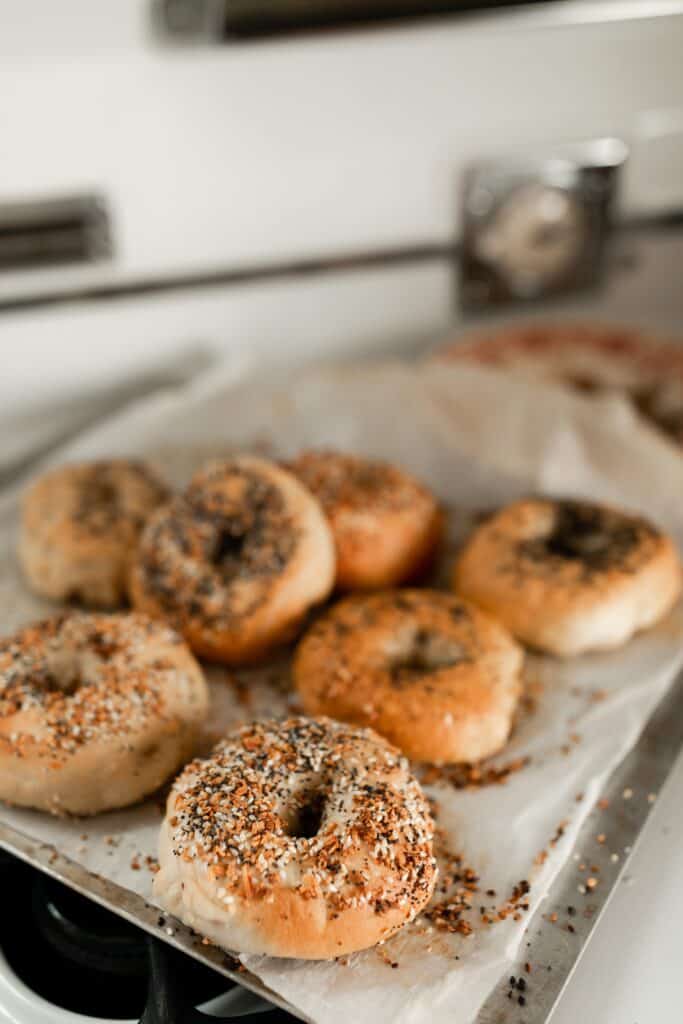
Tools you may need:
Measuring cups and spoons
Large pot or dutch oven
Parchment paper
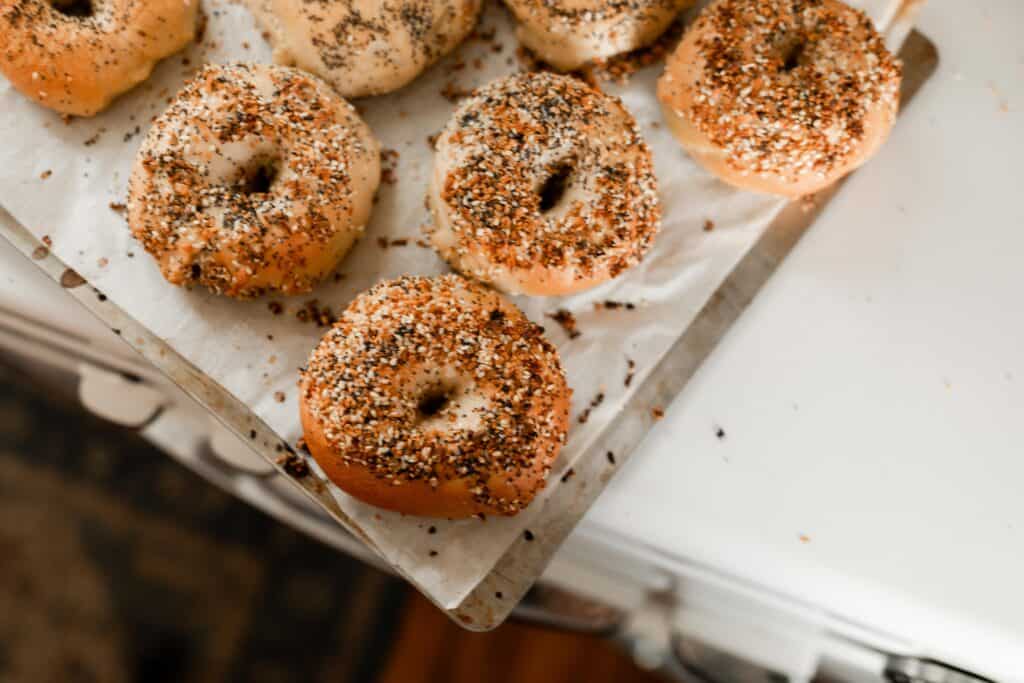
Topping ideas
- Shredded cheddar cheese
- Sesame seeds
- Dried onion/dried garlic flakes
- Poppy seeds
- Everything But The Bagel seasoning
- Cinnamon sugar topping
Additional Bagel Add-Ins:
Mix in these extras into the dough right before forming into bagels:
Blueberries – add fresh blueberries
Cinnamon and raisins
Chocolate chips

How To Make Sourdough Bagels From Scratch
Add sourdough starter, water, honey, salt, and two cups of flour to a stand mixer.
Mix until it comes together, about 10 minutes on low speed. The dough will be really stiff and difficult to incorporate.
Add remaining flour, half a cup at a time. Use a dough hook and knead until it is smooth and pliable. You could also knead by hand, but the stand mixer makes this process much easier.
Cover dough with wet tea towel, plastic wrap, or beeswax wrap; allow to ferment for 8 to 12 hours. Don’t just cover with a dry towel, because it will create a hard skin on the top of your dough, which you don’t want.
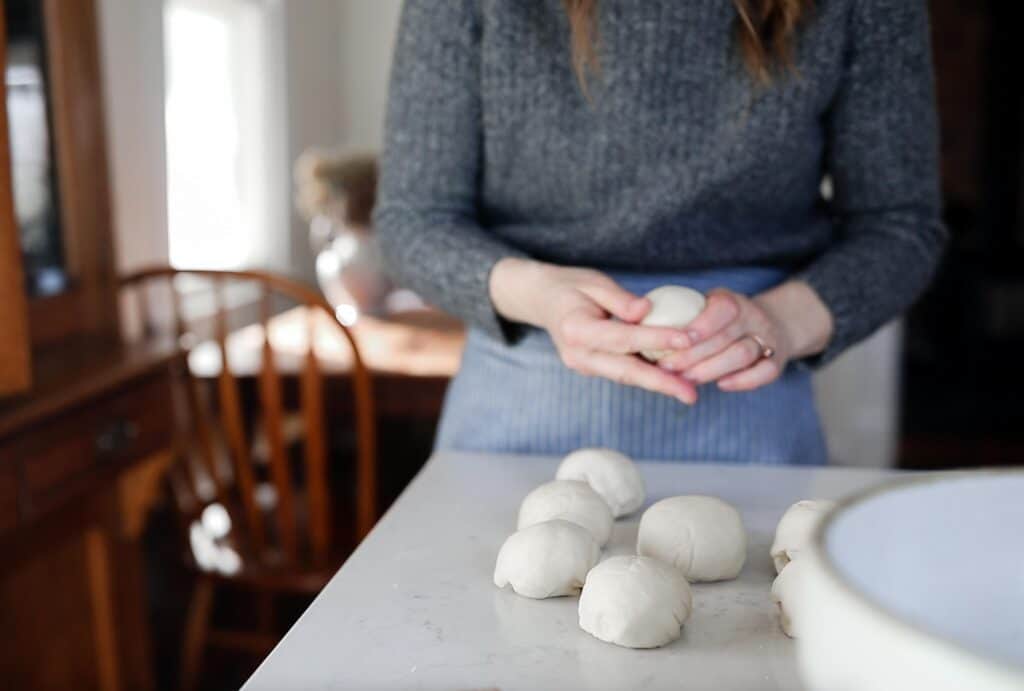
After the dough has fermented, divide into 8 equal pieces.
Roll the dough into balls, flatten them down a bit, and poke a hole in the middle with your finger. Stretch the hole a bit to widen.
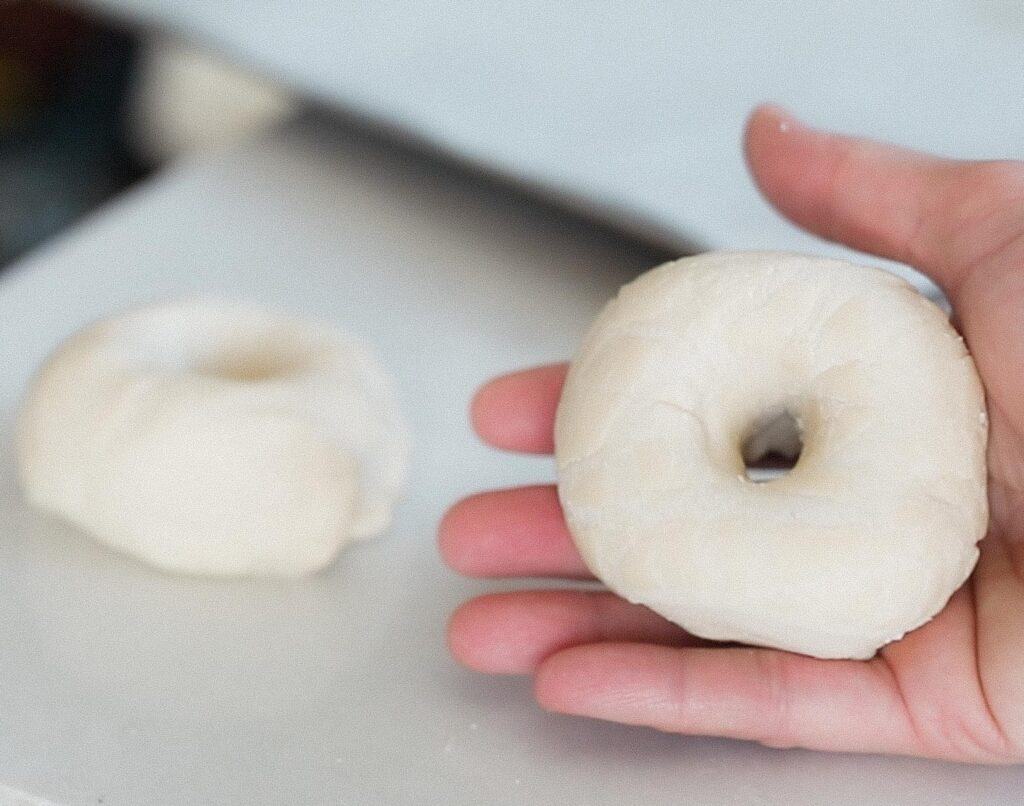
Cover with a tea towel and allow the dough to rise in a warm spot for two hours or until puffy. The time will depend on how warm your house is. It could take 1 to 4 hours.
Preheat oven to 425 degrees.
Bring a large pot of water to a boil and add the baking soda and sugar.
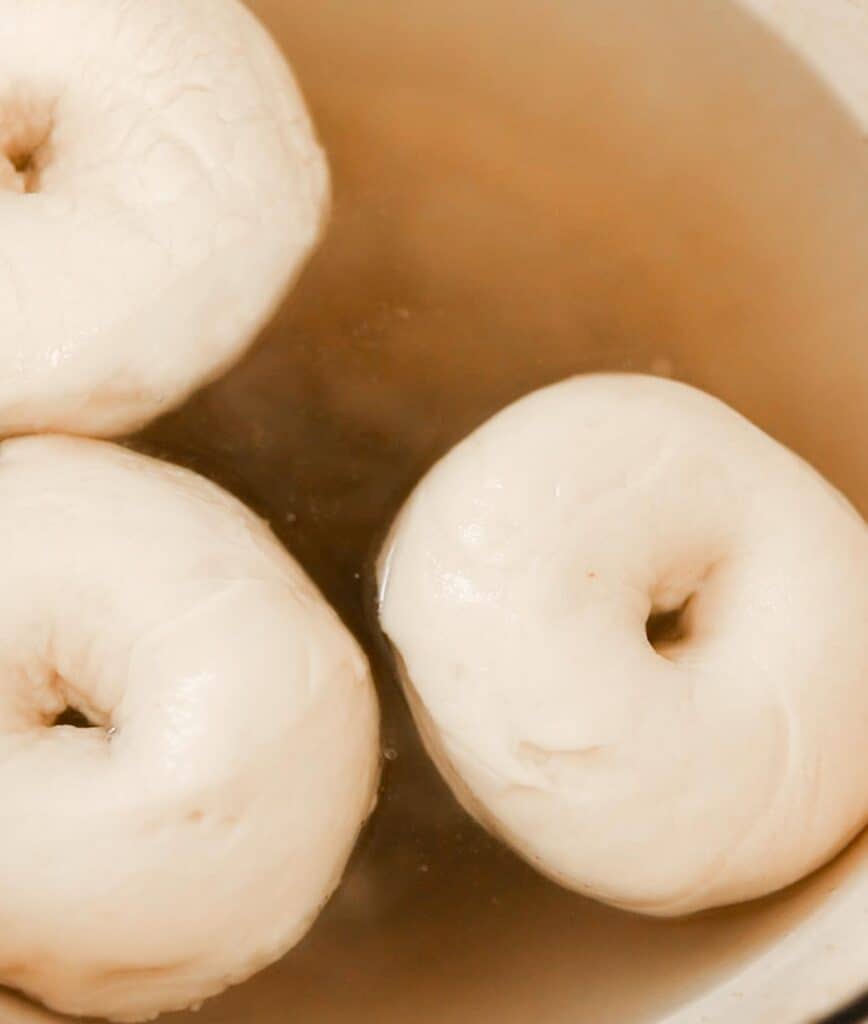
Using a slotted spoon, gently add bagels to the water and boil for one minute, flip, then boil for another minute.
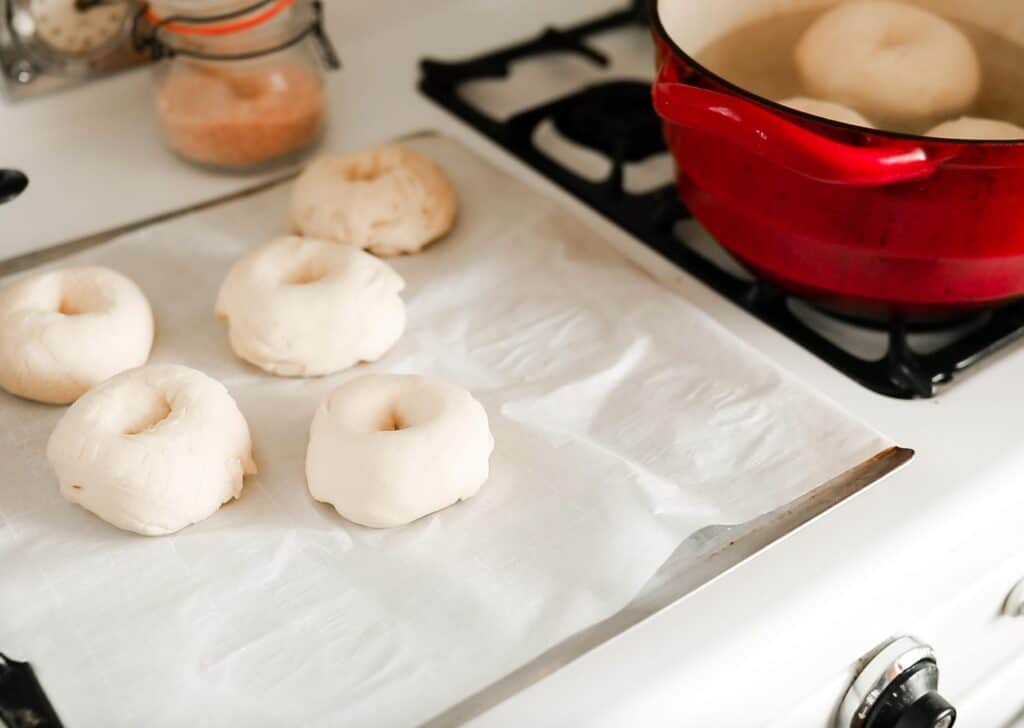
Shake off excess water and dip into desired toppings (optional).

Place boiled bagels on parchment-lined baking sheet.
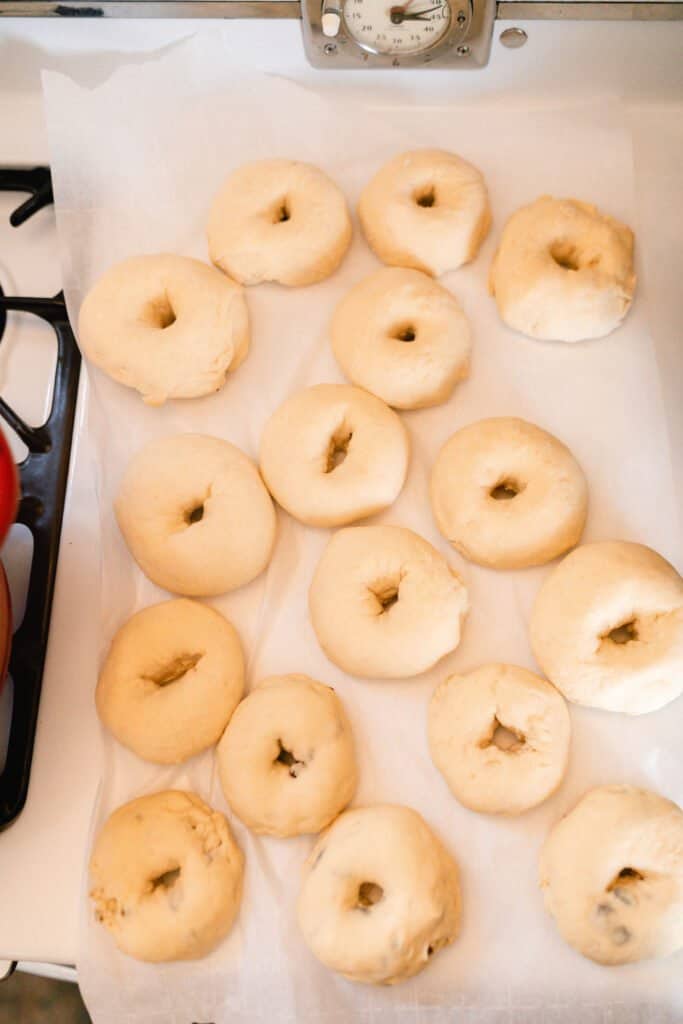
Bake for 20-25 minutes, or until golden on top.
Sourdough Bagel Sandwich Ideas
Truly, a sourdough bagel is a vessel for the yummy toppings you want to add.
- Breakfast sandwich – add a fried egg, bacon or sausage, cheese, and some lettuce for a yummy way to start your morning.
- Cream cheese and veggie. Spread cream cheese on bagel, add slices of tomato, cucumber, avocado (optional). Sprinkle with salt and enjoy.
- Avocado… bagel. Rather than toast. Add sliced avocado and sprinkle with salt.
- Locks – cream cheese and smoked salmon (locks) make a really delicious sandwich any time of day.
- Turkey club. Really any of your favorite lunch meat will do; top with slices of cheese, tomato, avocado, and an egg.
- Ham and cheese. Top with ham and a slice of Swiss or cheddar cheese. Bake it in the oven until the cheese starts to melt. Honey mustard takes this up a notch.
- Add chicken salad

Find More Sourdough Recipes:
If you try this recipe and love it, I would love if you could come back and give it 5 stars!
Sourdough Bagels

Ingredients
- ½ cup sourdough starter, bubbly and active (113 grams)
- 1 cup water, 236 grams
- 2 tablespoons honey, 21 grams
- 2 teaspoons salt, 10 grams
- 4 cups unbleached all purpose flour, 560 grams
For boiling the bagels
- 2 quarts water
- 1 tablespoon baking soda
- 1 tablespoon brown sugar
Instructions
- Add sourdough starter, water, honey, salt, and two cups flour to a stand mixer.
- Mix until it comes together, about 10 minutes on low speed. The dough will be really stiff and difficult to incorporate.
- Add remaining flour, half a cup at a time. Use a dough hook and knead until it is smooth and pliable.
- Cover dough with wet tea towel, plastic wrap, or beeswax wrap and allow to ferment for 8 to 12 hours.
- After fermentation, divide into 8 equal pieces.
- Roll the dough into balls, flatten them down a bit, and poke a hole in the middle with your finger. Stretch the hole a bit to widen.
- Cover with a tea towel and allow the dough to rise in a warm spot for 1-4 hours or until puffy.
- Preheat oven to 425 degrees.
- Bring a large pot of water to a boil and add the baking soda and sugar.
- Using a slotted spoon, gently add bagels to the water and boil for one minute, flip, then boil for another minute.
- Shake off excess water and dip into desired toppings (optional).
- Place boiled bagels on parchment-lined baking sheet.
- Bake for 20-25 minutes, or until golden on top.
Notes
- Use a slotted spoon or ‘spider’ strainer to flip and to pull the bagels out of the boiling water.
- Cook 2-4 bagels in the baking soda water at a time. Don’t overcrowd your pot.
- You can knead the dough by hand or use a stand mixer. A stand mixer is much easier and less time consuming.
Nutrition
Nutrition information is automatically calculated, so should only be used as an approximation.







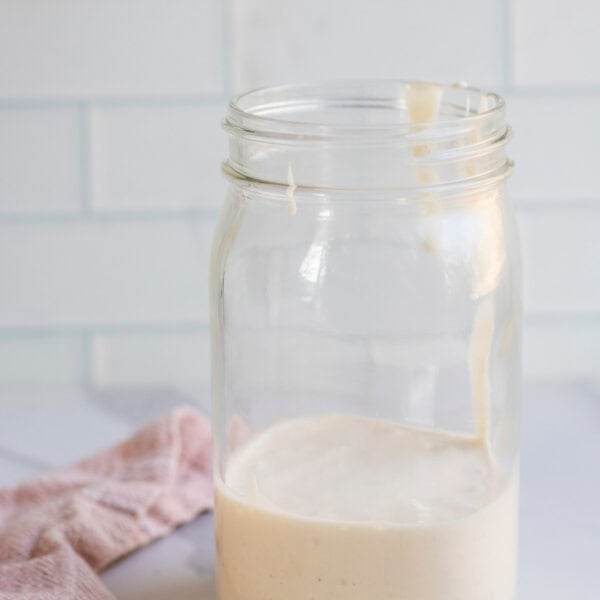
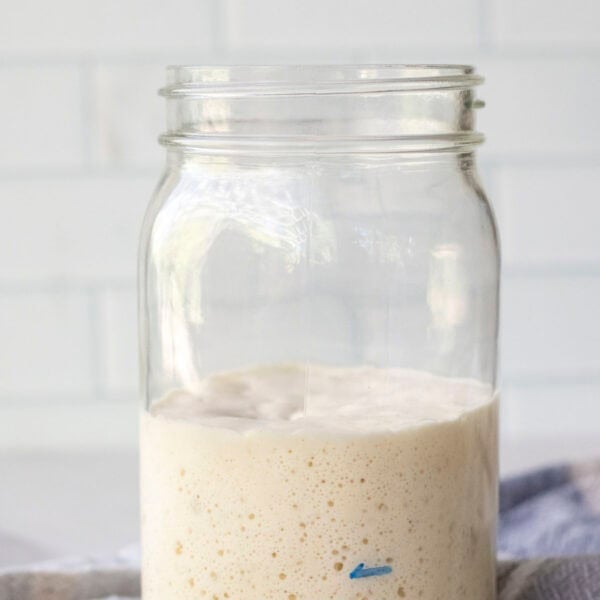
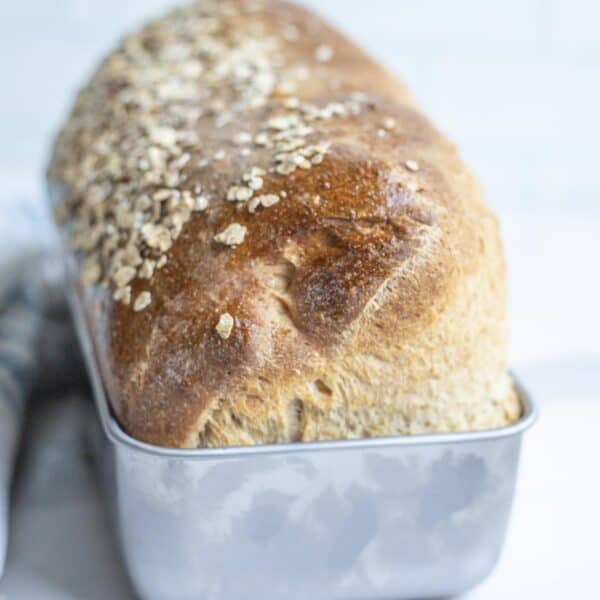
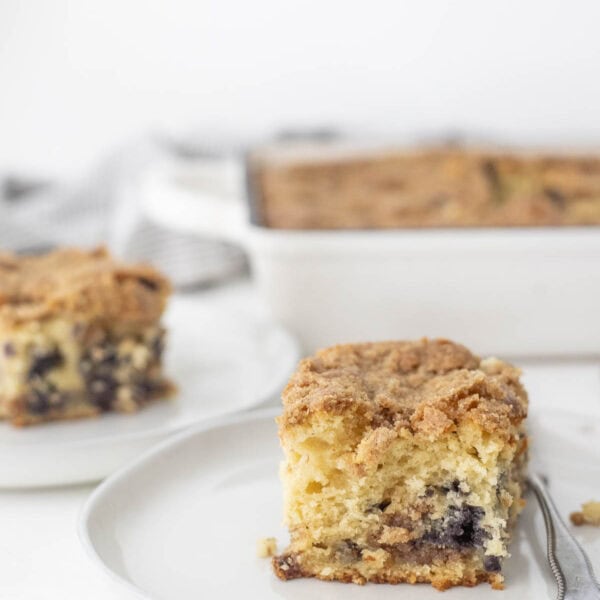






Do I have to boil them before I bake them?
Yes.
Thank you so much for sharing this recipe. I have made these 3 times already, and although they did not come out great the first 2 times (they were sticky and very misshapen after boiling, and the hole of the bagel disappeared as well- not a very pretty sight for a bagel!), I was determined to try again and make them better. The 3rd time I made them, they were perfect.
I only did 3 1/2 cups of flour, as the dough seemed firm and smooth after kneading at this point and I did not want them to come out dry. I had them rise for 8.5 hours in my 69 degree home and although it did not rise too much, the dough was still puffy and I did not want them to over proof, so I decided to proceed. Formed them, put them in the oven with the light on for 1.5 hours, boiled and baked with everything bagel seasoning as directed. They tasted just as they should – chewy, firm crust but soft on the inside, with a delicious taste. Thank you SO much for this great recipe! Love all your content!
I am wondering, could you replace sugar with honey if you don’t have any honey on hand?
Glad they worked this time! You can replace honey with sugar for this recipe.
Can I let it ferment longer than 12 hours?
Yes, but you have to be careful because the dough can overproof and become a sticky mess!
Could I substitute the brown sugar with coconut palm sugar?
I haven’t done that, but I would think it would be okay!
Question: can you put in fridge overnight after bulk fermentation? If so, would you let them come to room temp before putting in boiling water??
Yes, you can put it in the fridge overnight and then let them come back to room temperature before boiling and baking.
I’m having the opposite problem to step 2 & 3. Initially my dough is very pliable upon first mix then as I add the remaining flour it begins to be tough and even breaking apart. Any advice you have would be greatly appreciated!
I would try omitting the last little bit of flour before you reach the stiffness like you’re talking about.
Is the dough supposed to rise much during the 8-12 hr fermentation? Or after you shape them and let sit 1-4 hrs? Mine barely rose at all and ended up kinda dense.
Let them sit for 1-4 hours after you shape them. It will help the dough to rise some more.
I’m a little unclear. It says to mix the dough then says to use the dough hook to knead. Does that mean I use the flat beater to mix and then switch to the dough hook, or am I using the dough hook from the beginning? Thanks.
I had same question. Following for update.
I’m currently making these and have the donuts with holes in them sitting under a tea towel for the 1-4 hours, question its been one hour and I see no difference. Will it hurt if I let them sit out for more than 4 hours? or what’s the cut off time for sitting out under the tea towel before boiling them? Thank you
You can let them sit out a little longer. With the colder temps, it could take longer for them to rise.
I am attempting these currently. Should the dough rise during the 8-12 hour fermenting period? I’m 6 hours in and it hasn’t risen barely at all!
It should rise during the 8-12 hour fermenting period. Some factors will make a difference in your rise, like the condition of your sourdough starter and the temperature in your house. With it being colder, that can effect how quickly they rise. Hope this helps.